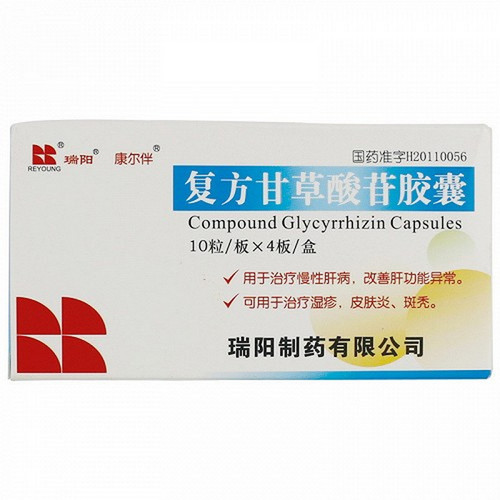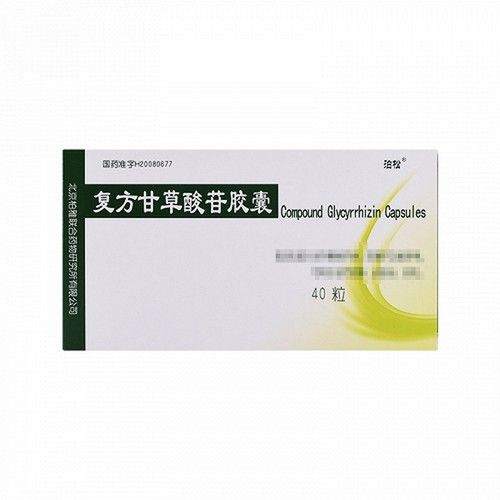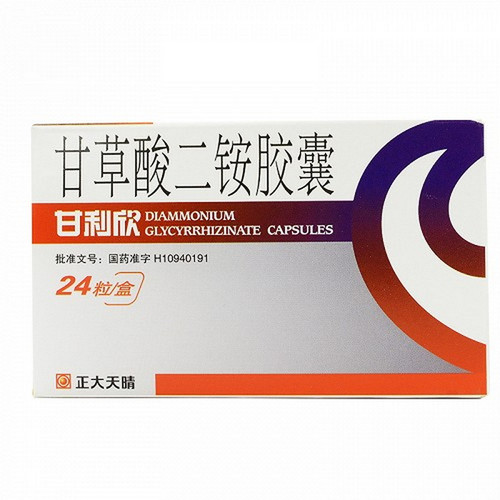Product Overview
[Drug Name]
Generic Name: Compound Glycyrrhizin Capsules
Trade Name: Ruiyangyuan Kangfufang Glycyrrhizin Capsules 18 Capsules
Pinyin Code: RuiYangYuanKang FuFangGanCaoSuanZuoJiaoNang 18Li
[Main Ingredients]
This product is a compound preparation. Each capsule contains: 25 mg of glycyrrhizin; 25 mg of glycine; and 25 mg of methionine.
[Properties]
This product is a pale yellow granule.
[Indications/Main Functions]
Treats chronic liver disease and improves liver function abnormalities. Can be used to treat eczema, dermatitis, and alopecia areata.
[Specifications]
18 capsules
[Dosage]
Adults: 2-3 capsules at a time. Children: 1 capsule at a time, 3 times a day. Orally, take after meals. The dosage may be increased or decreased based on age and symptoms.
[Adverse Reactions]
Adults: 2-3 capsules at a time. Children: 1 capsule at a time, 3 times a day. Orally, take after meals. The dosage may be increased or decreased as appropriate based on age and symptoms.
[Contraindications]
1. Patients with aldosteronism, myopathy, and hypokalemia (can aggravate hypokalemia and hypertension). This medication is not recommended. 2. Patients with advanced liver cirrhosis who are prone to elevated blood ammonia levels (the methionine metabolites contained in this preparation can inhibit urea synthesis, thereby reducing the ability to process ammonia).
[Drug Interactions]
Drug interactions may occur if used concurrently with other medications. Please consult your physician or pharmacist for details.
[Precautions]
1. Use with caution. Use with caution in elderly patients (elderly patients have a high incidence of hypokalemia (refer to medication for the elderly). 2. General precautions. Since this preparation contains glycyrrhizic acid, when used in combination with other licorice preparations, it can increase the level of glycyrrhizic acid in the body and easily cause pseudoaldosteronism. Caution should be exercised.
[Use in children]
Not yet clear.
[Use in elderly patients]
Not yet clear.
[Overdose]
Not yet clear.
[Pharmacology and toxicology]
Pharmacological effects: 1. Anti-inflammatory effect (1) Anti-allergic effect: Glycyrrhizic acid It has anti-allergic effects such as suppressing local allergic reactions (Arthus Phenomenon) and inhibiting Schwartzman phenomenon (Shwartzman Phenomenon). It has an effect on corticosteroids, which can enhance the hormone's stress response inhibition effect and antagonize the hormone's anti-granulation and thymic atrophy effect. It has no effect on the hormone's exudation effect. (2) Inhibitory effect on arachidonic acid metabolic enzymes Glycyrrhizic acid glycoside can directly bind to phospholipase A2, the initiator of the arachidonic acid metabolic pathway, and act on It binds to lipoxygenase, which produces inflammatory mediators from arachidonic acid, and selectively blocks the phosphorylation of these enzymes, thereby inhibiting their activation. 2. Immunomodulatory effects: Glycyrrhizic acid glycoside has the following immunomodulatory effects in in vitro tests: (1) regulatory effects on T cell activation; (2) induction of interferon Y; (3) activation of NK cells; (4) promotion of extrathymic T lymphocyte differentiation. 3. Inhibitory effect on experimental hepatocyte damage In invitro primary cultured rat hepatocyte line Glycyrrhizic acid glycosides have the effect of inhibiting liver cell damage caused by carbon tetrachloride. 4. Inhibiting viral proliferation and inactivating viruses: In experiments with MHV (mouse hepatitis virus) infection in mice, glycyrrhizic acid glycosides can prolong their survival. In experiments with vaccinia virus (Vaccinia virus), glycyrrhizic acid glycosides have the effect of preventing the onset of pox. In vitro experiments have also observed inhibitory effects on the proliferation of herpes viruses and inactivation of viruses. It has been reported that glycine and methionine can inhibit the reduction in urine volume and sodium excretion caused by oral administration of glycyrrhizic acid glycosides to rats.






